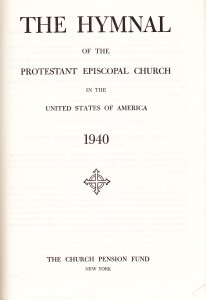Tragedy, they say, usually repeats itself as farce—an observation that might well be made about the political correctness that permeates our mainline churches.
After all, the vision of well-fed, pompous prelates doing the sort of things required by cutting edge liturgists—liturgical dance immediately springs to mind—is really quite shriekingly funny.
And it is by no means solely the liturgy that is affected. Church music has also fallen foul of the language police.
Hymns, for instance, are no longer called hymns in our more fashionable churches. These days they are known as “Songs of Praise.” A friend of mine was once naïve enough to ask why.
“Hymn is a sexist word,” he was told.
“But,” protested my friend, “the word hymn is derived from the Greek for song. It has nothing to do with the battle of the sexes.”
“That doesn’t matter. It sounds sexist,” was the reply.
If that strikes you as weird, think of the great old hymns that have been thrown out or bowdlerized for no less bizarre reasons.
“Stand up! Stand up for Jesus!” is out because it discriminates against paraplegics. “O for a thousand tongues to sing,” is out because it discriminates against folks who can’t speak.
“Onward Christian soldiers,” is out because it is militaristic. “Soldiers of Christ, arise,” is out on grounds of both militarism and discrimination against the “differently abled.”
The indignities inflicted on time-hallowed hymns are by no means restricted to outright proscription.
We have for many years celebrated Holy Communion in a retirement community where the Presbyterian Church USA hymnal is in use, and it’s our usual practice to ask the worshipers what hymns they would like to sing.
“Do you want them in Portuguese, Korean, or Spanish?” some wit invariably asks.
The hymnal, I should emphasize, is not a “multilingual” book; it is intended for English-speaking congregations, and the foreign language hymns are transcribed phonetically.
It is difficult to grasp the purpose of inviting parishioners to massacre hymns in unknown tongues when they are perfectly familiar with the words in English. It is, I suppose, a genuflection to the modern fad of “multiculturism.”
Yet even the English versions of familiar favorites cannot be trusted. The language, for instance, is frequently expurgated to eliminate masculine nouns and pronouns. How about “Faith of our parents” or “Sit down, O persons of God”?
 My mother-in-law was far from old-fashioned and had little time for pointless sentimental humbug about the “good old days.” Many of those old days weren’t so very good, she pointed out.
My mother-in-law was far from old-fashioned and had little time for pointless sentimental humbug about the “good old days.” Many of those old days weren’t so very good, she pointed out.
That stipulated, she often told us how much she appreciated using the 1940 Hymnal when she visited us here in Baltimore. She enjoyed the old hymnal because it contains much of the great church music she had known and loved all her life, but had been abandoned by her own parish.
No less important, she enjoyed it because of the profundity of the words set to that music. Much it is not merely poetry of a very high order, but is also sublime in its theological expression.
Her own church had adopted a book of praise songs of a type that has become increasingly fashionable—and not just with younger congregations. She found the words and the sentiments they express very much less than inspiring.
A retired Methodist organist was less polite. “We call those songs Seven Eleven music,” she sniffed. “They consist of the same seven words repeated eleven times.”
Back in the late 1980s and early 1990s, when it was still possible to giggle smugly about such philistinism, a friend and I worked spasmodically on a parody that we dubbed “The Monosyllabic Liturgy.”
It was, I guess, quite sophomoric, but it was fun while it lasted.
We experimented with new responses to the Salutation “The Lord be with you” and replaced “And also with you” with “Likewise, I’m sure.”
We also toyed with new salutations such as “Get with it,” the response to which was “Right on!”
As this fell out of linguistic fashion, we had to replace it with “Stay cool, dudes”, the response to which was “Awe-some.” (That’s the trouble with these faddish hymns and liturgies. They get dated so quickly.)
We got our comeuppance, however, when my friend was visited by an acquaintance from seminary, at the time a fast-rising star in one of the mainline churches.
His visitor casually picked up “The Monosyllabic Liturgy” my friend had carelessly left lying around in his study. After flipping through the pages, he remarked: “You know this is very interesting. We really ought to try it. Could you let me have a copy?”
My friend muttered something about it not being finished yet and, after his visitor had departed, telephoned me in a state of panic.
“We’re going to have to get rid of it,” he told me, “I’m going to burn it. We’re just going to have to accept the fact that some things are utterly beyond parody.” GPH✠


